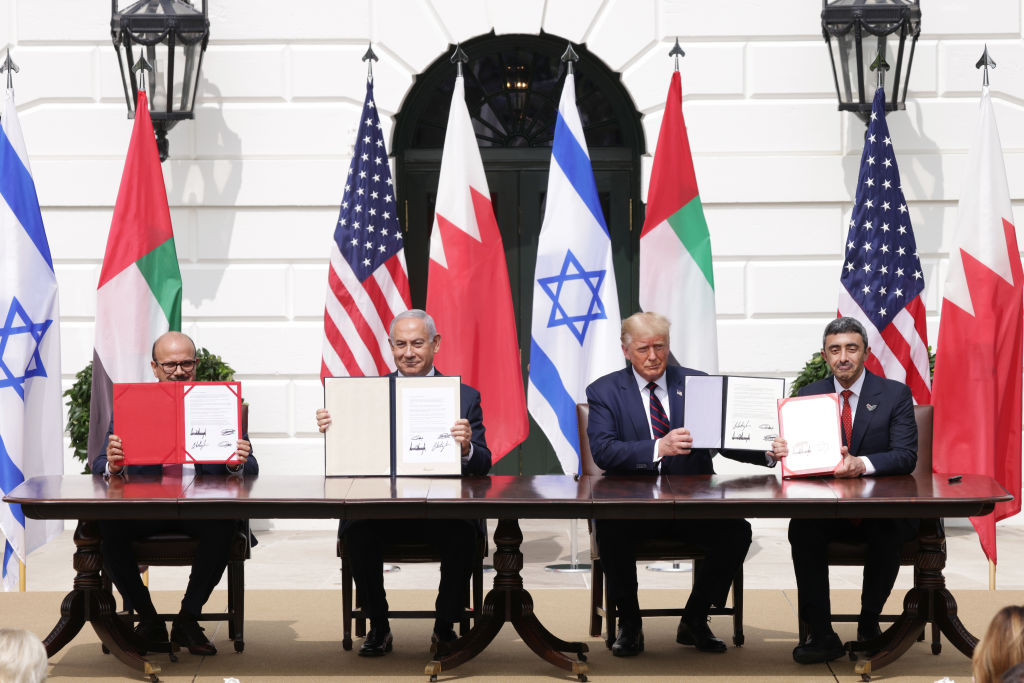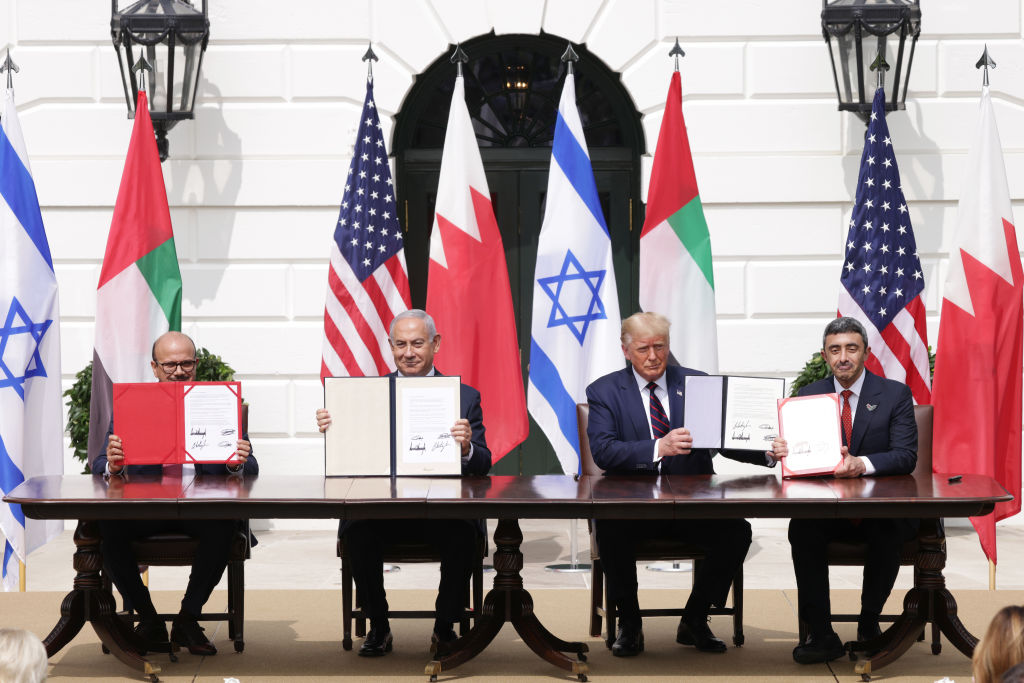Five years ago, I celebrated Rosh Hashanah in a gleaming ballroom at The Atlantis, one of the glitziest hotels in Dubai. A piece of history was made: the first public celebration of a new Jewish community established in the Arab world in over a century. The gathering applauded the normalization of Judaism in the United Arab Emirates, where Jewish residents had previously held the high holidays in an unmarked villa. Influential Emirati officials, including Youssef al-Otaiba, its ambassador to the United States, spoke alongside the rabbis.
[time-brightcove not-tgx=”true”]
It was also high stakes geopolitics. The gathering celebrated the Abraham Accords, which had been signed with great fanfare on the White House lawn a few days earlier, on Sept. 15, 2020. The agreement established diplomatic relations between Israel and several Arab states, starting with the UAE and Bahrain, its fellow Gulf Cooperation Council (GCC) member, and marked the first time any Arab state had normalized relations with Israel since Jordan in 1994.
The Abraham Accords were a major win for Israel, and the crowning foreign policy achievement of President Donald Trump’s first term. The agreement promised to integrate Israel into the defense, trade, and technological fabric of multiple Arab states that had, for decades, refused to even establish an embassy on Israeli soil unless it recognized a Palestinian state. For many Palestinians and supporters of their cause, however, it represented a crushing disappointment.
I live and teach in the UAE and witnessed a heady honeymoon between the Emirates and Israel in the first few years following the Abraham Accords. Emirati youth delegations visited Israel; Israeli and Emirati scholars co-presented their work at conferences all over Abu Dhabi; and festive meals were served following the Jewish and Islamic dietary laws when Passover and Ramadan overlapped. I even met young Emiratis studying Hebrew to improve their prospects of working for their own government. Jewish ritual baths, mikvahs, and kosher restaurants sprung up swiftly.
In December 2021, I found myself in a Dubai metro coach with at least 20 Hasidic Jews in their hats and curls, all riding safely. The first winters after the Accords also brought public menorah lightings for Hanukkah, with Emiratis proudly standing by, and sometimes lighting the candles, with Jewish community leaders. In central Dubai, I drove past a massive “Visit Israel” billboard, a display that would have been unthinkable elsewhere in the Arab world. In March 2023, the opulent Abrahamic Family House—an Abu Dhabi financed synagogue, church, and mosque complex—opened there, showcasing the capital’s pride in the Accords.
The Abraham Accords, Gaza, and the Gulf States
The honeymoon is over. Relations between Israel, the UAE, and Bahrain—the two Arab signatories of the Abraham Accords—are on the rocks in the aftermath of Israel’s brutal war in Gaza. On Sept. 9, the Accords were thrown into unprecedented turmoil when Israel bombed a villa in Doha, the capital of Qatar, which housed the Hamas team negotiating a ceasefire with Israel.
The United States has its largest military base in the Middle East in Qatar, which has spent over $8 billion to host the base. Washington is the principal security guarantor of Qatar and other GCC states. Following a personal request from President Barack Obama in 2011, Qatar began hosting the political leadership of Hamas to facilitate diplomatic communication.
After the Oct. 7, 2023 terror attacks by Hamas on Israel, Qatar’s Emir Tamim bin Hamad Al Thani proposed expelling Hamas from its territory in a meeting with Secretary of State Anthony Blinken. But Blinken wanted Qatar to use its contacts with Hamas to help mediate an agreement to free the Israeli hostages held by the group and potentially reach a ceasefire deal.
Despite all that, Israel still crossed the Rubicon of bombing Qatar. The attack killed five Hamas members and one Qatari security guard; the Hamas leaders whom Israel had targeted in the strike survived. Most decision makers in the UAE and Qatar did not expect Israel to be audacious enough to attack Doha, or the Trump Administration incompetent enough to stop it.
The UAE, whose largest city, Dubai, is a seven hour drive from Qatar, viewed the Israeli attack on its neighbor–for doing what Washington wanted–as a truly shocking breach of international norms. Saudi Arabia, the largest GCC country, which borders the UAE and Qatar, was working toward normalizing relations with Israel until the war in Gaza. For the UAE and Saudi Arabia, Israel’s attack in Doha signaled an increasingly unhinged impulse to militarily dominate the Middle East, and a contemptuous disregard for the interests of its Arab allies.
The mere whisper of violence in its immediate neighborhood, the Emiratis are aware, can send hard-won investments fleeing to quieter climes. For decades, the leaders of the UAE worked to transform its cities into stable, glittering centers of global commerce. Dubai alone attracts more ultra-wealthy migrants year after year than any country on the planet.
Abu Dhabi spearheaded the Abraham Accords—despite criticism from Palestinians—to elevate its stability and status. It winces at the notion of any outside power, be it Israel or Iran, destabilizing the GCC. Israel’s attacks on Iran in the summer, followed by its shocking attack on Doha, have been received by the UAE as rude repayment for that kindness. So the Emirati decision makers have begun reassessing Israel as a threat to regional stability increasingly on par with Iran.
Why attack Doha?
Why did Israel attack Qatar? Will the attack demolish President Trump’s signal foreign policy achievement, the Abraham Accords? Israel’s government feels emboldened by the United States imposing no red lines on its conduct throughout the two years of its war in Gaza or elsewhere in the Middle East. The day Israel bombed Doha, it also attacked Yemen, Syria, Lebanon, and Tunisia.
Beyond sheer hubris, Israeli domestic politics are also at play. Families of Israeli hostages held by Hamas have accused Prime Minister Benjamin Netanyahu of repeatedly sabotaging negotiations to create a “forever war” to stay in power. Indeed, Netanyahu is fixated on his political survival. Israel Katz, his Defense Minister, is likewise angling to lead Netanyahu’s Likud party. Netanyahu and Katz have won plaudits for the botched attack on Doha from the Israeli right. A host on Channel 14, a pro-government Israeli television channel, distributed sweets and champagne on air to applaud it.
Israel’s government also seems to fundamentally misunderstand the internal politics of the GCC countries, substituting brash presumptions for evidence-based analysis. It wrongly assumed that the UAE, Saudi Arabia, and Bahrain—all of whom loathe Hamas and see it as affiliated with a regional Muslim Brotherhood network hostile to their political control—still nurse the belligerence they harbored toward Qatar after the Arab Spring protests in the 2010s.
Qatar’s support for the pro-democracy protests antagonized its fellow Gulf Arab monarchies, which feared political turmoil on their soil. Saudi Arabia, the UAE, Bahrain, and Egypt severed relations with Qatar in 2017. After mending their ties in 2021, the GCC states have come to share a fraternal insistence on steering Arabian Gulf affairs from within. Israeli leaders seem to have incorrectly assumed that their GCC partners would “thank them later” for attacking Hamas in Doha. Emirati leaders’ response, marked by swift condemnations and the prompt visit of a historically high-ranking delegation to Doha, indicate that Israel’s government seriously misjudged the situation.
The future of the Abraham Accords
Israel’s war in Gaza and its drive to establish military dominance in the Middle East have degraded the Abraham Accords but will not disintegrate the agreement. People-to-people relations between Israel and the UAE waned after Israel’s forced displacement of Palestinians from Sheikh Jarrah neighborhood in East Jerusalem in 2021, and its killing of Shirin Abu Akleh, a renowned Palestinian journalist, in 2022. The visits virtually ended after Emirati citizens watched Israel’s live-streamed onslaught in Gaza. Societal relations are unlikely to improve before Israel agrees to a ceasefire in Gaza, gets a new government, and takes steps to establish a Palestinian state.
Yet, the UAE and Bahrain, which sunk significant diplomatic capital into the Abraham Accords, are unlikely to break the agreement. The UAE still benefits from its relationship with Israel, which facilitates technological exchanges in the military, financial, healthcare, and agriculture sectors. Being a signatory to the Abraham Accords offers Abu Dhabi continuous support in Washington, which remains its primary security partner, and can reassure investors that its cities will likely remain safe from Israeli aggression.
After the attack in Doha, Qatar reportedly asked the UAE and Bahrain to close their embassies in Israel—a step that would mean pulling out of the agreement—but both countries have ignored that request.
Nevertheless, the UAE will be looking for the loudest, low cost way to signal its significant anger at Israel. Abu Dhabi may expel Israel’s ambassador to the UAE, Yossi Shelley, a close confidante of Prime Minister Netanyahu, who shares his zeal for territorial expansionism. Since arriving in the UAE in February, Shelley has already caused two major scandals by harassing women in an Abu Dhabi bar and violating Emirati security protocols.
For the Gulf states, the best outcome of Israel’s attack on Qatar would be that Trump grasps its implications for the future of American power: Washington’s failure to defend one of its most important allies in the region could render its security guarantees meaningless and make partnerships with China and Russia more appealing.
The great hope of the Gulf Arabs is that Trump understands this and finally pressures Netanyahu to accept a ceasefire agreement, returning the region to something approaching calm. This, however, seems unlikely. On Tuesday, on a visit to Israel, Secretary of State Marco Rubio encouraged the claims of settlers and signaled that a ceasefire is remote. It seems that Netanyahu, not Trump, remains in charge.


